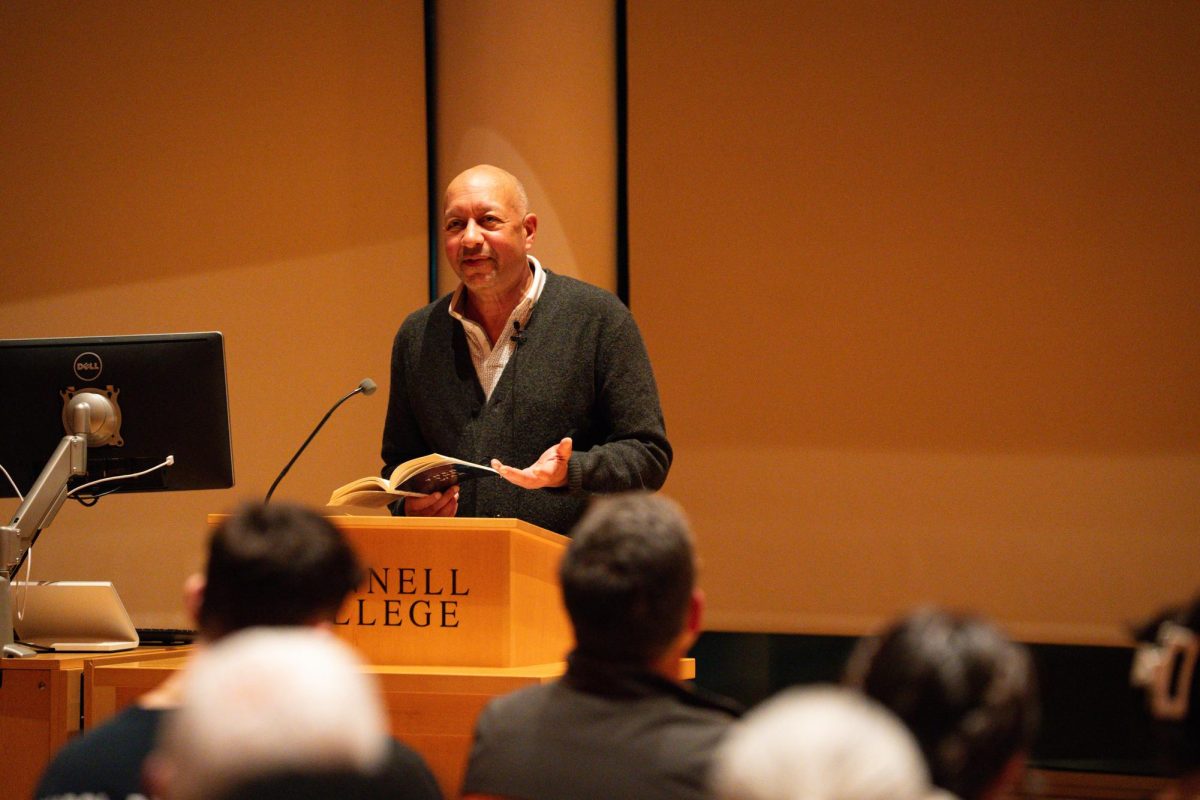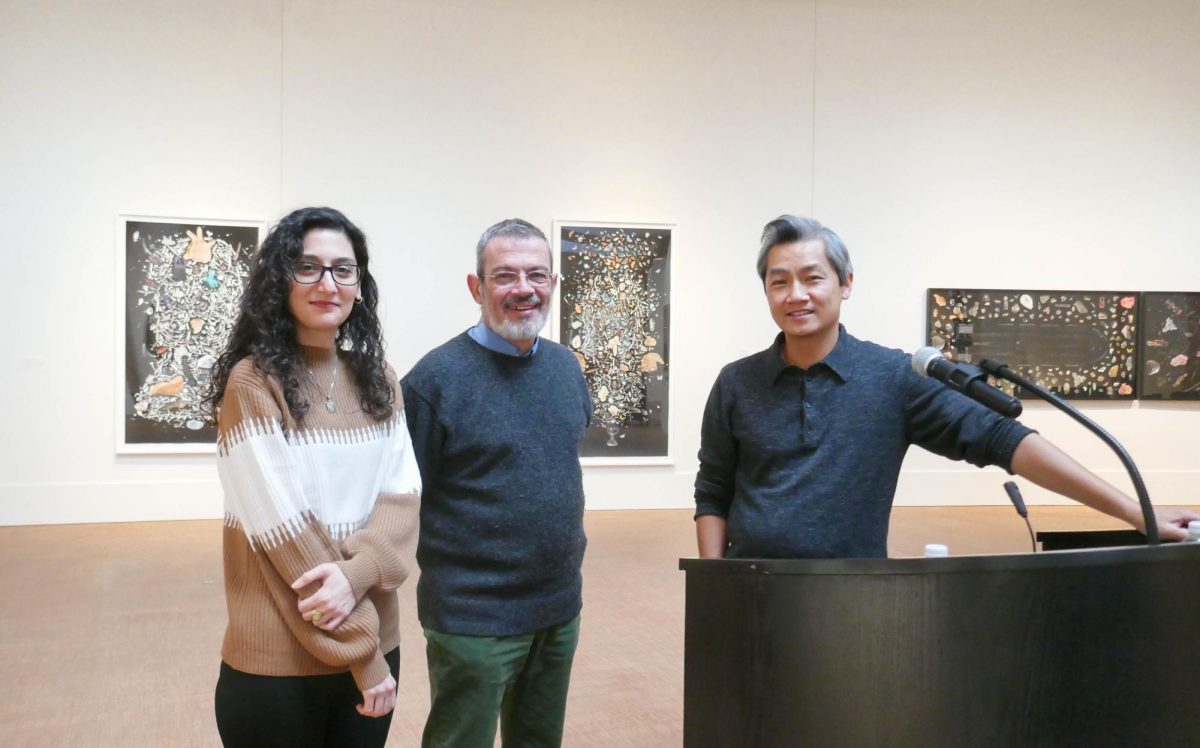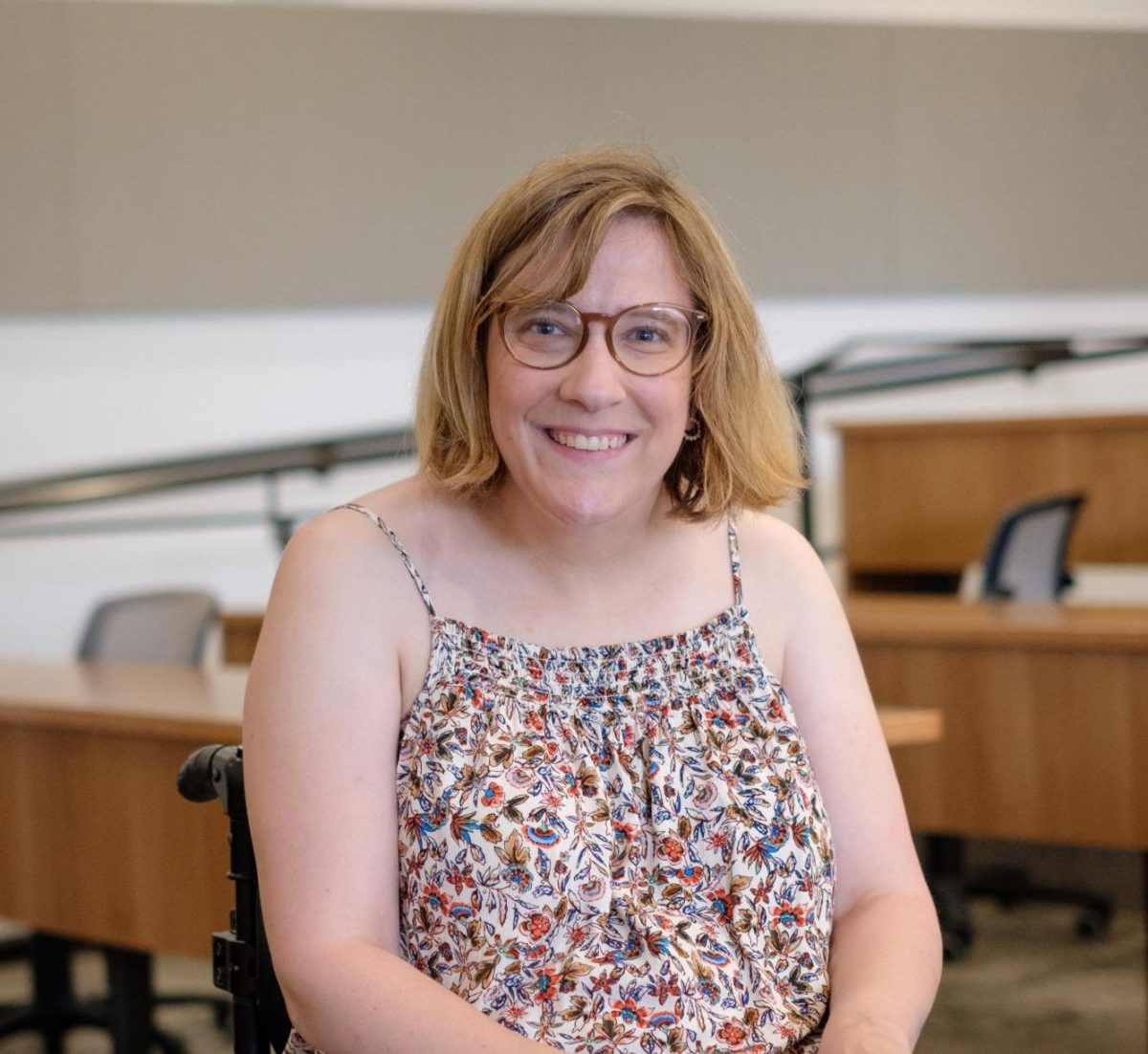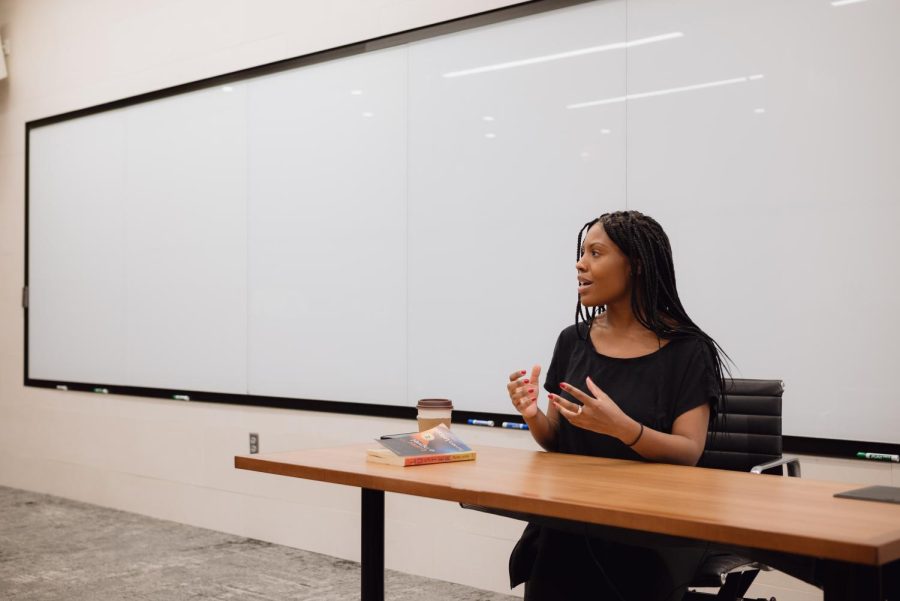After its release from Gray Wolf Press this year, Carmen Maria Machado’s debut short story collection won the prestigious title of finalist for the National Book Award. Currently an artist-in-residence at the University of Pennsylvania, she holds her MFA from the Iowa Writer’s Workshop. The S&B’s Mira Braneck sat down with Machado to discuss horror, story in the era of Trump and writing female sex.
Your stories are deeply unsettling in the best ways. What possibilities do you see in your use of horror or the scary, especially for stories about women?
I feel like the genre, like horror as a genre, is a genre that can be very reductive but also very subversive. Ultimately it’s about what we’re afraid of, like what are we anxious about that will happen or has happened. So it’s pretty useful. It doesn’t feel that radical, it feels like a pretty obvious tool to just sort of explore issues like race and gender and the body and all those things. “Get Out” would be a great example of a movie that came out this year that did that exact thing. So I feel like it’s just natural, it just makes sense that I would use it.
Your use of form is really interesting, and plays such an interesting role. Like a scary campfire story with directions of how to read it aloud, or a story of the apocalypse told through this inventory of sexual partners. How do you see form functioning in your writing?
I mean all stories have form. It might be a more traditional form, but it just exists, right? So for me, I’m really interested in places where stories appear in real life that don’t appear to be [stories]. So for example when you find a grocery list in your grocery cart that somebody else left in there. There’s a narrative in there, you know, and there’s a lens through which you can view the person’s life. And so it makes sense that you could use these unusual structures or less traditional structures to explore and examine ideas. I have to be careful, because I was really worried for a long time about getting pegged as a writer who only knows how to do that thing. So obviously my book has a lot of different examples, traditionally structured stories and untraditionally structured stories. … Everything has a shape. Why not that shape?
You do such a good job of writing pleasure in the female body. Can you talk about your philosophy of writing specifically female pleasure, when it’s often not broached in such a cohesive way?
There’s a couple ways of thinking about it. On one hand, I had a teacher once say to me, ‘You should give your characters a roll in the hay. They work hard, they deserve it.’ Which I thought was really funny, this idea that characters are doing all this work for your story, so make them happy for a minute, you know? … Have you ever seen the documentary about the MPAA, “This Film Is Not Yet Rated”? It’s really interesting. It’s about the group of people who decides what a movie is rated, and the double standard that exists, how corrupt and weird that system is. So for example, if there’s a movie with a woman having a visible orgasm, it’s automatically rated R. But the same, with men, it can be PG-13 still. And it’s true of queer and straight sex, like queer sex will automatically get an R-rating or an NC-17 rating, and straight sex won’t. So basically there’s this double standard where certain kinds of pleasure are punished, like queer sex and sex where women are enjoying themselves. So yeah, it’s like why not do the thing that people get punished for doing? ‘Cause that’s why I want to write, that’s why I want to read. Not always. Like obviously in my book there are situations that aren’t necessarily pleasurable but involve the body and involve sex. But also there are a lot of them [that do], because that’s what I wanted to do.
How do you draw the line between real and fantasy or the surreal in your stories?
I don’t really. I feel like we already exist on the verge of fantasy in our regular lives, and so I don’t really think about it. Certain writers think about world-building in very cohesive ways. Like Tolkien, for example, was this very meticulous world builder, who had this elaborate, completely thought out, secondary world in middle earth. And there are writers like C.S. Lewis, who would just write these insane, nonsensical fantasy worlds, with Santa Claus and fawns and lampposts, where the reasoning is like, whatever. I think of that latter way, I call it ecstatic world building, so it’s not thinking about, what are the logistical rules of this world, but what is the emotional truth shining through, and then sort of marshalling various elements of genre to that purpose. So yeah, it’s not thought out. I’d be lying if I said, oh it’s all part of this plan that I have. I just sort of let myself write what I want to write.
Do you think fantasy and the unsettling and horror allow for that emotional truth to come out in ways that get us towards our reality in our stories? Our emotional realities.
I think the interesting thing about writing liminal fantasy is yeah, you can express certain truths in ways that are a little more straightforward and that seem similar even when they’re not. It’s just an interesting tool. It defamiliarizes it. It takes this essential thing about sexual violence, for example, and turns it a little bit, and when you hand it back to the person, it looks fresh and new, even though it’s not. These ideas have been around, but I’m just sort of revisiting them I guess.
I understand that “Her Body and Other Parties” was the title of your thesis in your MFA program. How has that phrase changed since then, for you?
That book, my thesis, which is only available in print, in the library, at the University of Iowa library, only has three stories in common with my finished book. It’s not very good. It’s pretty rough. The phrase came up, when I was trying to figure out a title for my collection, and I was talking to a friend about how one titles a collection, and he was saying, well, traditionally, it’s usually a title from one of the stories, and it’s a title that sort of encompasses the theme of the book. But I didn’t feel like any of [my titles] worked as a book title. So I just sort of started mashing together the titles of stories until I mixed together “Difficult at Parties” and
“Real Women Have Bodies,” and the result was that. … There’s a structure in the short story title, where it’s like something-something and other stories, or whatever. And it’s usually the title and other stories. And there’s this really good collection by Ted Chiang called Stories of Your Life and Others, which is a double entendre, right, it’s like “and other stories,” and “and other lives.” So I liked that idea, I liked that using “and other” structure to just have a little fun with the title. And I figured that out way before the rest of the book was finished. But it was just a good title, and luckily they let me keep it, so I feel pretty good about it.
How has your writing changed since you were an undergrad?
Since I was an undergrad? … I mean as much as I can possibly imagine. I was an undergrad 12 years ago. Even five years ago, when I published this collection there was this story that was five years old and I had to rewrite it sentence by sentence, because the prose wasn’t up to my current standard. So if you’re doing it right, your style will always be changing and evolving and tightening and getting stronger. … I’ll look back at stories that I’ve really liked, even now, like my book is out and I’ll read the stories and be like, I like these, but I would write these differently now than I would have like three years ago. So it’s just a very odd process, because you’re always improving, or you should be, anyway.
We read, in [Professor] Alissa’s [Nutting, English] class today, your piece about Trump winning the election. I was just thinking, for you, what do you see as the power of story in the Trump era?
I think it’s the same it’s always been. I don’t know, it’s hard because obviously it’s really terrible right now, but I feel like it’s been terrible for a really long time in different ways. It’s more visible now. I think we’re in this very unique moment where Trump is particularly terrible, and he can’t keep his mouth shut, so it’s very obvious. His incompetency and his evil is more obvious than other politicians. … But the world’s been shit for most people for like, ever. But I think stories are lifeblood, that they keep us alive in their own ways. A good example would be the Harvey Weinstein stuff. There’s this narrative that’s been happening of women being like, oh yeah, women knew. Women would tell each other to stay away from him. There’s this whisper-network with these stories being told and that was a thing trying to keep people safe when the official narrative wasn’t anything, using this informality of stories. So I feel like there’s something really important and sort of special about that quality of story-telling. Even if you’re writing fiction, you’re delivering essential truths, or at least that’s what you should be doing. Everyone doesn’t do that. But that’s my goal as a writer — I’m delivering a truth, a thing that I think is true, and that I think can help other people.
Alissa teaches a feminist memoir course, so we read a lot of your nonfiction that’s published online for today’s class. I was really struck by the difference in style between your fiction and your nonfiction. Do you have a different approach, or can you talk about your different approach to each?
Nonfiction is just a really different mental process. I can write fiction really quickly, but it takes me a really long time to write essays. It takes me like months and months and months and months and months to get it right. I don’t know if you read “The Trash Heap Has Spoken,” that was one that I published in Guernica earlier this year. And that’s an essay I’ve been trying to write for five years. And I only finally found myself where I could get my hands around it. Because I feel like part of writing memoir is trying to step back and understand your own mind, which is really hard, right? Because you’re in it, so it’s hard to see the shape of it. Everyone’s different, but for me, it’s really hard to write, it just takes longer. And it’s more emotionally difficult, so it’s just a different process. So yeah, they probably seem different because they are, it’s just coming from a different part of my body, I guess.
One last question. Do you have any feminist books or publications or works in general that have been formative to you that would recommend to a college student?
Sure. Angela Carter’s “The Bloody Chamber,” which is sort of a classic. Reimagining fairytales from a feminist perspective. It’s really good, it’s beautiful. There’s this really phenomenal book called “How To Suppress Women’s Writing,” by Joanna Russ. Are you familiar?
We read your piece on Neil Gaiman.
Yeah so that book is really good, actually. I read that they’re going to do a new edition of it … it’s weird, it’s sort of in print, but not really, it’s like this weird thing. So that book is amazing and actually, it’s weird, because it was written before either of us was born, but she just nails [it], and it’s depressing because she wrote it like 40 years ago or more, in the ‘70s I think, and it’s still exactly as awful as it was that time. And that sucks, you think we would have made some progress.
Even [your] piece, showing how [it’s the same].
Right, exactly, it’s depressing as hell. And that one’s really important. I’m trying to think of others, I mean there are so many … oh, Shirley Jackson, “The Haunting of Hell House,” which I love. Virginia Woolf. That’s a good list.
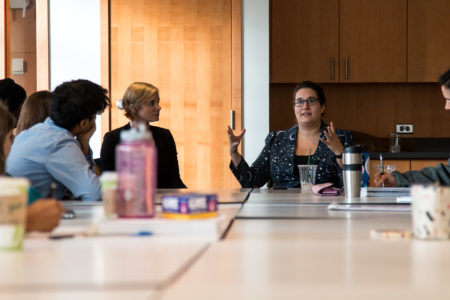
Photo by Helena Gruensteidl




























































